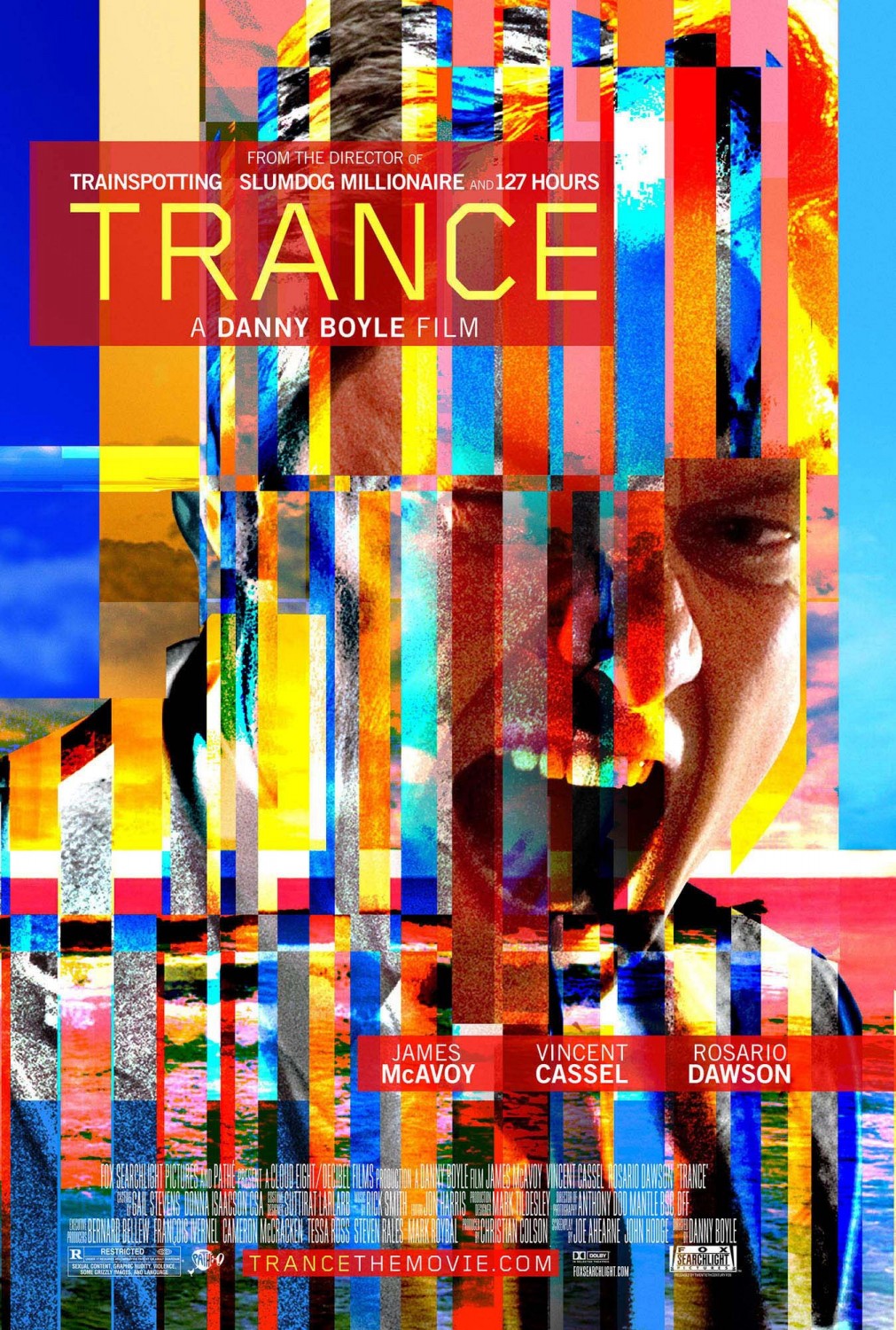Trance
Directed by Danny Boyle, Trance has the hybrid genre of Crime and Drama and focuses upon an art auctioneer who tries to find a lost painting using hypnotherapy. (May also be seen as a Heist/Caper/Mindbender) Narrative is hinged on Modernism with a touch of Social Realism which is used throughout Boyle's work (Trainspotting, Slumdog Millionaire) to represent British cinema and its fascination since the fourties to reflect the lives of the audiences who can personally identify with each key micro aspect of a film. Social realism "puts the experiences of real Britons on the screen." (BFI) - kitchen sink
Trance was not a preconceived idea (unlike the stereotypical Hollywood film) and was written by the film's makers for the pre-production, showing the less manufactured and more creative face of British cinema in comparison to American.
Trance was not a preconceived idea (unlike the stereotypical Hollywood film) and was written by the film's makers for the pre-production, showing the less manufactured and more creative face of British cinema in comparison to American.
Created after Boyle directed the London 2012 Olympic Opening ceremony (showing his appreciation of British culture), this film with a classification of 15 (according to the British Board of Film Classification) contrasts against this high-spirited and family orientated event due to its inclusion of strong bloody violence, language and nudity; Boyle described this as an "evil distant cousin." [1]
The British Film Industry's cultural test, created in 2007, "determines whether a film can qualify as a British production." [2] Trance qualifies as British as it scores more than 16 points on this test; For instance, the film is set in the UK, its leading characters are British, the original dialogue is English, and the director is British, etc.
The British Film Industry's cultural test, created in 2007, "determines whether a film can qualify as a British production." [2] Trance qualifies as British as it scores more than 16 points on this test; For instance, the film is set in the UK, its leading characters are British, the original dialogue is English, and the director is British, etc.
Budget: Approximately $20 million
Box office: Trance has a worldwide gross of $24,252,013, making only a $4 million profit due to the somewhat large budget.
Stars: James McAvoy (who campaigned himself against the abolishment of the UK film council after 2000, showing his pride for the growing British culture in films) - A perhaps bankable face known worldwide to attract wider audiences, particularly those in America as he recently starred in Xmen: First Class alongside Jennifer Lawrence, one of Hollywood's most prominent actresses stemming from her acclaim in The Hunger Games and Silver Linings Playbook, all of which being American award winning box office successes. Furthermore, he has previously starred in TV shows such as Early Doors and Shameless, the latter embodying our gritty British 'kitchen sink' culture and social realism, whilst many British TV actors move their familiar faces into the film industry. Rosario Dawson also stars within this, who also acted within the award-winning Black Swan.
Genre: Crime/Drama hybrid. This stems away from other big budgeted films, particularly in American blockbusters, as these typically follow certain trends in genre (The Genre Model). For example, films of the Superhero genre are currently popular (perhaps as they embody a variety of sub-genres for wider audiences to be appealed to, alongside the narratives being a familiar tried and tested formula), such as within The Avengers, The Amazing Spider-Man, Iron Man 3 and Thor. Boyle's lack of following this modern trend through an uncommon and unique film genre shows the less manufactured style of British films, which don't mindlessly appeal to mass audiences in order to gain money. The American blockbuster trend reflects the 1940's, when the 'quota' system resulted in quickly made poor quality films. Although these films are well developed and use high quality technology such as realistic CGI and special effects, the ideology of no depth behind these hollow formulaic films still remains. This lack of artistic development to please mass audiences still occurs today, perhaps explaining why the film's profit was so low in comparison to American blockbusters.
Production: Pathe produced this film, as well as the recent British Philomena, and Boyle's Slumdog Millionaire and 127 Hours. Both Trance and films mediating around Britain's culture such as the gritty This Is England also had Film4 as a production company, one of Britain's largest companies.
 Marketing: This film poster immediately catches the eye due to its vibrant colouring and hypnotic vibe to reflect the film's narrative. Although McAvoy's face is shown to attract fans, his manic expression paired with the electric lines illustrate a more artistic theme to the film, again breaking away from typical American blockbusters. Distributed film posters and viral advertising therefore marketed this film.
Marketing: This film poster immediately catches the eye due to its vibrant colouring and hypnotic vibe to reflect the film's narrative. Although McAvoy's face is shown to attract fans, his manic expression paired with the electric lines illustrate a more artistic theme to the film, again breaking away from typical American blockbusters. Distributed film posters and viral advertising therefore marketed this film.Release date: 27th March 2013.
1) http://explore.bfi.org.uk/510b8a9aee20c
2) http://www.bbc.co.uk/news/entertainment-arts-25232305#story_continues_2
0 Comments:
Post a Comment